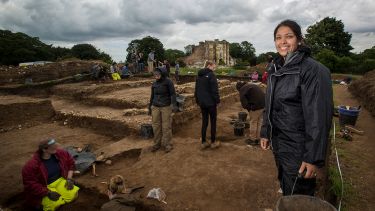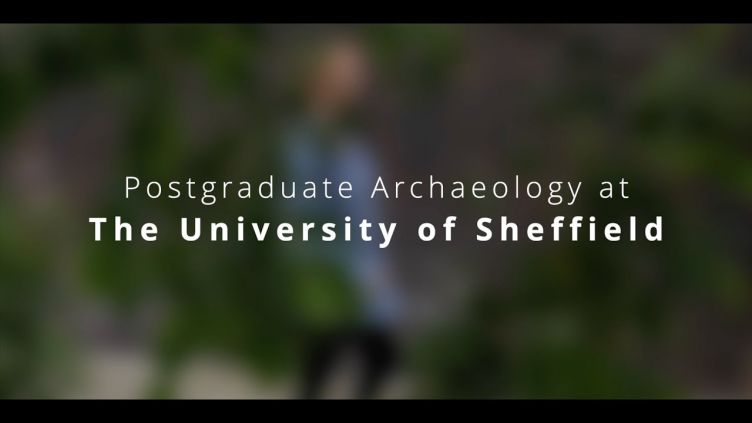Cultural Heritage MA
School of History, Philosophy and Digital Humanities,
Faculty of Arts and Humanities
-
Start date
September 2026 -
Duration
1 year 2 years -
Attendance
Full-time Part-time
Explore this course:
Apply now for 2026 entry or join us on a discovery afternoon to see where a Sheffield masters could take you.

Course description
This course provides students with the knowledge and skills needed to address challenges in global cultural heritage. You have the opportunity to develop skills necessary to work in the heritage industry and beyond, and to learn about debates and challenges in heritage management, digital heritage, archaeology, and the creative industries.
We build our courses around real-world challenges. Our students contribute their own broad interests and expertise to debates and issues, ranging from sustainability to popular representations of the past. Students visit cultural heritage sites and meet with professionals in the sector.
Graduates in cultural heritage studies at Sheffield go on to work in the heritage industry, in local government and in academia.
Modules
Core modules:
- Heritage, History and Identity
-
This module highlights the diversity of cultural heritage, ranging from cultural and 'natural' landscapes, through monuments to music, dress, cuisine, 'traditional' crafts, and language and dialect. It explores the role of these various forms of heritage in shaping local, regional and national identity; the extent to which they reflect or misrepresent local, regional and national history; the legal and ethical issues surrounding conservation and preservation of heritage; and how study of 'traditional' lifeways may contribute to understanding of history.
15 credits
Plus the below:
- Dissertation
- The Museum: History and Practice
- Cultural Heritage Today
- Stories in Stone: Understanding Built Heritage
Optional modules:
- Landscapes in archaeology: methods and perspectives
-
This unit introduces the ways in which researchers have thought about landscape in archaeology and situates these perspectives within the methods that are commonplace in landscape research. Through a mix of lectures, seminars and practicals we will explore a variety of themes that together reflect the broad range of contemporary issues in landscape studies. These approaches will be applied through an analysis of a specific landscape using skills in observational survey, cartographic analysis, archival research and aerial photography gained during the practical classes. The emphasis is upon grasping both the methods and their application to specific archaeological questions.
15 credits - Digital Mapping for the Humanities
-
This module will introduce students to digital mapping as sources, as methods and as outputs for humanities research. Digital mapping offers a wide variety of analytical and interpretive methods that are put to use in many humanities disciplines. Maps and mapping allow us to recognise social constructions of place, visualise patterns, gaps, and changes across time and space. By combining spatial and temporal dimensions into visual representation, digital mapping can provide innovative approaches, methods, techniques, interpretive practices, and solutions to different stages of research, from data collection to science communication. The module will be delivered through both discursive and 'hands-on' classes and will draw on case studies from across the arts and humanities. Students will critically engage and analyse multidisciplinary examples in which digital mapping is a core aspect of research. They will also make use of multiple methods and tools on digital mapping platforms to create, visualise, analyse, disseminate, and communicate spatial and temporal data and knowledge.
15 credits - Digital Cultural Heritage: Theory and Practice
-
This module examines the theoretical and methodological advances in Digital Cultural Heritage and their broader implications in fields concerned with the interpretation and presentation of the past. We will draw on theoretical readings as well as analyse the potential benefits and drawbacks of certain digital and online approaches. Topics include: principles and theories underlying Digital Cultural Heritage, understanding processes of creating digital surrogates, establishing principles for user experience, and exploring digital narratives for public dissemination. A major component of this module will be a semester-long project that will require the development of a proposal for a digital cultural heritage project.
15 credits - GIS for Archaeologists
-
Introduce the principles, methods and data structures employed in the analysis and reconstruction of archaeological landscapes using spatial technologies. Provide hands-on training in the application of ArcGIS in archaeological research and professional practice. Enable students to develop skills in interpretation and problem-solving using GIS. Develop students' critical understanding of how spatial technologies are used in archaeological research.
15 credits
The following modules may run in either semester depending on availability:
- Egypt in the Age of the Empire.
-
This module provides the student with a detailed knowledge of the archaeology of Dynastic Egypt during the New Kingdom, between 16th and 11th centuries BC (18th - 20th Dynasties). The module embeds Egypt in its late prehistoric Mediterranean and Near Eastern context and traces the development of Egyptian society, dynastic rule, societal structures and the relationship of Egypt with its neighbours. The module will use archaeological, textual and scientific evidence to explore how society is shaped by ideology, belief, power and conflict alongside the natural world.
15 credits - The Archaeology of Death and Burial
-
This module provides an advanced level exploration of human responses to death in societies around the world. Delivered through a series of themed lectures and seminars, case studies focus on the nature and interpretation of the burial record, and survey the methods of analysis, theoretical underpinnings and material residues of funerary ritual helping the student to develop a broad knowledge of burial rites and a nuanced understanding of the discipline of funerary archaeology.
15 credits
Plus the below:
- Introduction to Creative and Cultural Industries
- Languages for All option module
The content of our courses is reviewed annually to make sure it's up-to-date and relevant. Individual modules are occasionally updated or withdrawn. This is in response to discoveries through our world-leading research; funding changes; professional accreditation requirements; student or employer feedback; outcomes of reviews; and variations in staff or student numbers. In the event of any change we will inform students and take reasonable steps to minimise disruption.
Open days
Interested in postgraduate taught study? Join us on a discovery afternoon to see where a Sheffield masters could take you or register your interest in studying at Sheffield.
Duration
- 1 year full-time
- 2 years part-time
Teaching
Cultural heritage is a dynamic field, and this is reflected in the variety of teaching on the course. You can expect a balanced timetable of lectures, seminars and workshops.
Many of our classes include a fieldwork or project-based component, which will take you out of the classroom to explore the rich historic environment of Sheffield and its surrounding area.
We integrate humanities and science-based approaches to nurture a deeper understanding of the past and present. You’ll have the opportunity to explore different viewpoints and contribute your own expertise within our vibrant, multidisciplinary student community..
We'll help you to apply what you learn to real-world challenges, and to develop skills you can use beyond university. What we ask of you, as a member of our lively academic community, is that you challenge, question and explore.
Fieldwork
All our masters students have the option to get involved in research projects – in the UK, Europe and elsewhere.
Assessment
Your assessments will include essays, project work, creative tasks and a dissertation.
Your career
Cultural heritage graduates are valued by employers from many different sectors. These include charities, finance, retail and administration, teaching, environmental work, and of course the heritage sector, universities, museums, archaeology parks, national and local government.
Employers increasingly recognise that in addition to rigorous academic training within an unusually broad-based framework, the study of cultural heritage also provides students with a variety of sought-after practical skills and the ability to work both independently and as part of a team.
Recent cultural heritage graduates have gone on to work as:
- Heritage and wellbeing lead
- Museum staff
- Historic buildings project officer
- Heritage consultant
- PhD researcher
- Researcher and lecturer
- Commercial field archaeologist
- Deputy business manager
School
School of History, Philosophy and Digital Humanities
In the School of History, Philosophy and Digital Humanities, we interrogate some of the most significant and pressing aspects of human life, offering new perspectives and tackling globally significant issues.
As a postgraduate history student at Sheffield you’ll be taught by historians who are engaged in cutting-edge research in a huge variety of fields which range from 1000 BCE right up to the twenty-first century and encompasses traditional historians and expert archaeologists. This diversity feeds into a vibrant and varied curriculum which allows students to pursue their interests across both space and time, from the ancient Middle East to modern day Europe, and from fifteenth-century human sacrifice to twentieth-century genocide.
You'll join a thriving and supportive postgraduate community which organises a wide variety of social and research events to help you feel fully immersed in our community and allow you to share your ideas, challenge your thinking and broaden your understanding.
Student profiles

Studying at Sheffield has been an unforgettable experience
Shaomeng Sun
Postgraduate Student,
School of History, Philosophy and Digital Humanities
Entry requirements
Minimum 2:1 undergraduate honours degree in a relevant subject.
Subject requirements
Your degree should be in an Arts and Humanities or Social Sciences subject.
View an indicative list of degree titles we would consider
English language requirements
IELTS 6.5 (with 6 in each component) or University equivalent
Other requirements
If you have any questions about entry requirements, please contact the school.
Fees and funding
Save on your course fees
Apply
You can apply now using our Postgraduate Online Application Form. It's a quick and easy process.
Contact
Any supervisors and research areas listed are indicative and may change before the start of the course.
Recognition of professional qualifications: from 1 January 2021, in order to have any UK professional qualifications recognised for work in an EU country across a number of regulated and other professions you need to apply to the host country for recognition. Read information from the UK government and the EU Regulated Professions Database.

